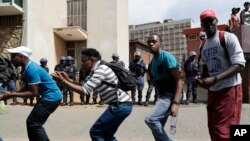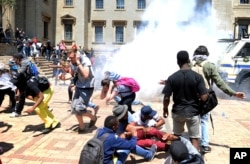Violent protests have raged on South African campuses in recent weeks as students demand free university tuition for all in a nation still riven by inequality and racial divisions.
It seems like a straightforward demand, and one that few people - from university leaders to parents, to church leaders, to even the South African government - seriously disagree with.
But despite this emerging consensus, protests are showing no sign of stopping after they first emerged late last year. In recent weeks, protests have swept across most of South Africa’s 26 universities, with violent clashes between students and police at some campuses. Some universities have been forced to suspend classes, citing security concerns.
Presidential spokesman Bongani Ngqulunga says the event that spurred this round of protests - September’s announcement that universities could raise fees by as much as 8 percent - is irrelevant, because the government has pledged to cover that increase for lower-income students, which is about 75 percent of the student population.
Student movement
So why are the protests continuing? It is, he says, partly because the student movement is competing - with itself.
“I mean, if you look at the protests, interestingly they are not led by university student leaders, those who are members of the student representative councils,” he told VOA. “They are led by students who are outside of these formal structures. And there’s been a bit of competition, frankly, about who can make more radical and extreme demands.”
Social justice activist Rehad Desai puts it more charitably, saying that the student movement is still finding its feet and settling on an ideology. “They’re at the beginnings, at the embryonic stages, of building a new student movement,” said Desai, who is also a filmmaker and made a well-received film on a 2012 mining strike that led to the police shootings of 34 striking miners. “And they want to do that on the basis of as much consensus as possible. Now that takes time, to hearing to hearing all voices and so on.”
Law student Thabo Boom is deputy secretary general of the University of the Witwatersrand’s Student Representative Council. He says the anti-fee movement is fairly unified at his university, and that his group tries to maintain that unity by making its members check their political differences at the door. Still, he says, that leads to diverse views even within the movement.
Concerns about studies
But they all agree on one thing.
“None of the students that are protesting want to be repeating the year,” he said. “And I can tell you, as one of the students who has been involved from the get-go, I too want to ensure that I don’t lose a year, as I can’t afford to be there in any case.”
So how do they get out of this rut? Bishop Ziphozihle Siwa, the head of the South African Council of Churches, says these dug-in parties need an impartial mediator to bring everyone to the negotiating table.
“They are going to run out of patience, because we are asking them to calm down but nothing is changing. So we’re trying to calm the students, we’re trying to organize some conversation between all the stakeholders to say: priority is to calm the situation, get the police out of there and then continue the negotiations.”
But Siwa adds that the students’ grievances started well before they were born, even before he was born -- when the racist apartheid regime drew a hard line between black and white, rich and poor. How long will it take to find middle ground? No one knows.





